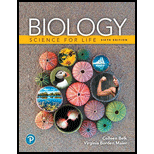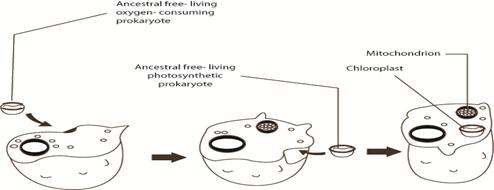
EBK BIOLOGY
6th Edition
ISBN: 9780134819150
Author: Maier
Publisher: VST
expand_more
expand_more
format_list_bulleted
Concept explainers
Textbook Question
Chapter 14, Problem 2LTB
Add labels to the figure that follows, which illustrates the endosymbiotic hypothesis.

Expert Solution & Answer
Want to see the full answer?
Check out a sample textbook solution
Students have asked these similar questions
Briefly describe what endosymbiotic theory is. Describe a few ways in which endosymbiotic theory has changed the way scientists think about the ancestral distinctions among the three domains.
Explain what is meant by endosymbiotic theory.
From the pictures interpret the tree using real branch lengths. What can you infer?
How many major clades can you see? Do they belong to the same class, order, family, and genus? Why or why not?
Chapter 14 Solutions
EBK BIOLOGY
Ch. 14 - How many different species have been identified by...Ch. 14 - Add labels to the figure that follows, which...Ch. 14 - How are hypotheses about the evolutionary...Ch. 14 - Which of the following kingdoms or domains is a...Ch. 14 - Comparisons of ribosomal RNA among many different...Ch. 14 - On examining cells under a microscope, you notice...Ch. 14 - The mitochondria in a eukaryotic cell ___________....Ch. 14 - Prob. 8LTBCh. 14 - Prob. 9LTBCh. 14 - Phylogenies are created based on the principle...
Ch. 14 - Unless handled properly by living systems, oxygen...Ch. 14 - Imagine you have found an organism that has never...Ch. 14 - Support for the endosymbiotic theory for the...Ch. 14 - Research a species of plant, animal, fungi, or...Ch. 14 - Scientists initially rejected the endosymbiotic...Ch. 14 - The science that you learned in this chapter has...
Knowledge Booster
Learn more about
Need a deep-dive on the concept behind this application? Look no further. Learn more about this topic, biology and related others by exploring similar questions and additional content below.Similar questions
- Give correct typing answerarrow_forwardconsider the following terms: Envelope Fusion Gene therapy Pathogen Vaccine Capsule Decomposer Epidemic Mold Spore Yeast Choose 2 terms from the list and answer the following questions for each term: What familiarity and prior knowledge do you have about the term? What does the term mean in everyday language to everyday people? Use examples to help describe your thoughts. How do people use the word? What does the term mean in technical language to biologists? How is the term related to the course student learning outcome: Describe classifications of biological diversity? What are the similarities and differences between the everyday and technical meanings and uses of the term? What impact might the similarities and differences have on your learning of biology concepts in this course?arrow_forwardDiscuss the Endosymbiotic Theory. Do you think it is a strong explanation on how the eukaryotes emerged on Earth?arrow_forward
- Give typing answer with explanation and conclusion In thinking about the clinical application of phylogenetics, discuss the role of phylogenetics in these areas. a) Predictions of drug resistance b) Identifying the origin of an outbreak c)Predicting the spread of a diseasearrow_forwardWhich is a piece of evidence that supports the endosymbiotic theory? Select all that apply. (Group of answer choices) A. many bacteria are resistant to antibiotics B. eukaryotic cells have cell membranes C. mitochondria have their own DNA D. chloroplast DNA is more similar to cyanobacteria DNA than eukaryotic DNA E. ribosomes are present in eukaryotic cells F. mitochondria must divide to multiply, cells can't build themarrow_forwardUse the table to answer the question. In 1928, Frederick Griffith injected four groups of mice with different strains of the bacteria, Streptococcus pneumoniae. The smooth strain had a polysaccharide capsule that protected the bacteria from the mouse’s immune system. The rough strain did not have this capsule. The details of each group and the results of the experiment are shown in the table below. Bacteria After injection with bacteria Group 1 smooth strain mice died Group 2 rough strain mice survived Group 3 heat-killed smooth strain mice survived Group 4 rough strain mixed with heat-killed smooth strain mice died Which conclusion about Group 4 is MOST strongly supported by the results of the experiment? A. A virus carried DNA from the smooth strain to the rough strain. B. The rough strain took in DNA from the heat-killed smooth strain. C. The rough strain developed a genetic mutation during binary fission. D. The smooth strain…arrow_forward
- Does the following phylogenetic tree provide evidence to support or refute the endosymbiosis hypothesis? Briefly explain your choice (1-2 sentences) Bacteria a-Proteobacteria Mitochondria Archaea Eukarya Excavata Discicristata Alveolata Stramenopila Rhizaria Plantae Opisthokonta Amoebozoaarrow_forwardDrag and drop the labels into the correct empty boxes to complete the concept map. serotype Kingdom bacillus spirochete Domain genus species cocci Borrelia burgdorferi Reset Archaea subspecies Ancestral Cell Line Bacteria strain exhibit differing characteristics Photo - Source: CDC/Claudia Molins/Janice Haney Carr Eukarya stimulates a distinct pattern of antibodiesarrow_forwardDraw a simple sketch illustrating the way in which aerobic bacteria are hypothesized to have become incorporated into an original prokaryotic host cell.arrow_forward
- Choose one of the phylogenetic schemes in Figure 10.5 and explain why you feel it is preferable to the others.arrow_forward* 0O 100 v Ao you would use to identify this species (what features would you use personally to ID). ^タヘ三 臣ヘ= 5. View the protists blood parasites (Trypanosoma cruzi, Trypanosoma brucei, and Plasmodium vivax). Which of these species is more likely to cause the most human issues (in terms of number of people with the disease)? What is one of the most likely ways to keep from being infected by any of these blood parasites? Explain. 6. What are slime molds? 7. Identify the organisms below. Next to each name you ID the organism as, give 2 features that helped you come to that determination. Name of organism: a. Features used to ID: 771 words English (U.S.) Text Predictions: On DEOL 8. ca上門后 MacBook Air 71 64 000 F4 F5 F6 F8 F2 F3 23 2$ 5. 6. 4. R.arrow_forwardOscillatoria is a thread-shaped Cyanobacteria, while Spirogyra is a thread-shaped Protist. Make a table the difference!arrow_forward
arrow_back_ios
SEE MORE QUESTIONS
arrow_forward_ios
Recommended textbooks for you

Endosymbiotic Theory; Author: Amoeba Sisters;https://www.youtube.com/watch?v=FGnS-Xk0ZqU;License: Standard Youtube License